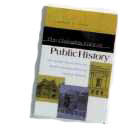|
M i r r o r t o t h e p a s t
The Changing Face of Public History:
The Chicago Historical Society and the Transformation of an American Museum
By Catherine M. Lewis
2005, Northern Illinois University Press
Paper, $22.00
137 pages. Notes, Bibliography, and Index.
Within the context of the ever-changing and vitally important world of public history, Catherine M. Lewis presents a candid, insightful, and rewarding look inside one of America's most celebrated cultural institutions.
The Changing Face of Public History provides ample depth, offering the Chicago Historical Society as a case study to determine the answers (or at least find a general direction) to public history's most pressing questions. Swept along in the raging currents of financial instability,  buffeted by the changing winds of public interest and scrutiny, and caught between the special interest agendas of competing culture warriors, museums, historical agencies, and public educators all share common challenges. buffeted by the changing winds of public interest and scrutiny, and caught between the special interest agendas of competing culture warriors, museums, historical agencies, and public educators all share common challenges.
What kinds of responsibilities do we have toward our constituencies? We ignore the public and such questions at our peril. By presenting the Chicago Historical Society (CHS) as a leading institution representative of industry trends, Lewis provides us, educators all, with context, a historical framework and best of all, hope.
Like many historical societies, CHS was founded by community elites to perpetuate and preserve "the patriotic past." A temple of intellectual and cultural achievements, CLIS celebrated the past and its heroes, while leaving many voices unheard and many stories untold.
As Lewis has graphically pointed out, however, time can and will change the "Face of Public History." By the 1960s and beyond, CHS began blending discussion with celebration and became more diverse and more inclusive. Driven by talented leaders, changing trends in funding, and by rapidly changing community and visitor demographics, interpretive authority evolved into a shared arrangement between curators and community. In its quest for a larger role and greater service to the public, CHS grew beyond the walls of a history museum into a public forum for discussion, a center for urban history research and dialogue. Change driven by a "demand for relevance" produced landmark exhibits such as "Neighborhoods: Keepers of Culture," in 1992 and "Out of the Loop" in 2001. Such exhibitions helped transfer some interpretive authority to the community and effective collaboration came "to be the rule."
The Changing Face of Public History at CHS is a mirror worth looking at and into. As public historians and educators it is our responsibility to be relevant to our communities. Industry leaders like Robert Archibald are showing us the way to that relevance by demanding and pleading that we embrace the issues of importance today by using the lessons of the past. Urban planning decisions (or lack thereof) of yesteryear have brought us today's triumphs and challenges. Exurban sprawl, gridlock, and an increasingly homogenized society demand our immediate attention. As Catherine Lewis notes, visitor demographics and donor demographics are also shifting. These new visitors and donors are "demanding accountability and transparency." They also demand relevance.
By presenting CHS as an industry mirror, Lewis has provided a worthwhile tool to use in constructing that relevance. As many communities mindlessly expand, paving over productive cropland and natural resources while worshiping at the altar of "progress" (currently defined by big blue box stores and brightly colored arches on acres of asphalt), museums, public educators, and public historians can offer an alternative.
Perhaps historical agencies can no longer afford to remain on the margins of society politically, socially, and morally. Like CHS, issues of race, immigration, and the environment can be meaningfully discussed and put into historical perspective within our classrooms, galleries, and symposia. Then perhaps possible donors may be awakened to our potential and new visitors may be encouraged to join in our debate.
Let's all take Lonnie Bunch's advice and not avoid controversy. Instead, let's offer "opportunities for discussion and reflection." As Lewis and the Chicago Historical Society are doing, let's make history "truly useful and relevant."
John Weck is an Adjunct History Instructor at Harper College in Palatine.
|

